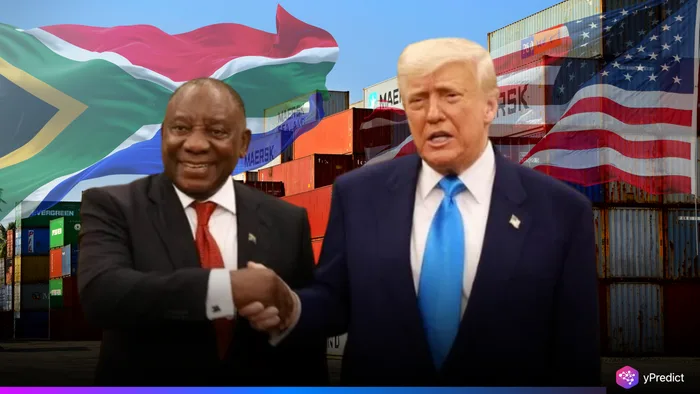
The United States has officially announced a 30% tariff on all South African products entering its market, starting August 7. President Donald Trump declared this new trade measure just one week before the deadline. The decision targets South Africa alone among sub-Saharan nations and reflects the increasingly strained relationship between Trump and South African President Cyril Ramaphosa.
For South Africa, this move carries massive economic consequences. The United States is the country’s second-largest trading partner. South African industries, especially automobiles, agriculture and textiles, had long benefited from duty-free access under the African Growth and Opportunity Act (Agoa). That privilege now faces a sudden and devastating reversal.
Despite efforts to prevent this trade disruption, South Africa failed to secure a new agreement with Washington. According to Reuters, the government proposed purchasing US liquefied natural gas, easing poultry import rules, and investing $3.3 billion into US sectors like mining. None of those offers swayed the Trump administration.
Why South Africa Was Singled Out in the Tariff Crackdown
Trump’s administration has often clashed with Ramaphosa’s leadership. While the US maintains more lenient tariff increases of 15% for neighboring nations like Lesotho and Zimbabwe, South Africa alone faces the full 30% trade penalty.
The decision surprised analysts, as it breaks from the pattern of broader regional enforcement. Sources in Washington claim the Trump camp believes South Africa has grown “too close” to countries that oppose US interests. This includes increasing diplomatic ties with China, Russia and members of BRICS. Trump has also criticised the South African land reform program, calling it “a disaster for farmers.”
The South Africa tariff comes just months before the US elections. Many experts see the move as a signal to domestic voters, showing Trump’s willingness to act tough on trade—even at the cost of diplomatic fallout.
Impact on South African Industries Dependent on Agoa
South Africa’s reliance on Agoa exports makes this tariff especially painful. Since 2000, Agoa has given African nations duty-free access to US markets for hundreds of products. South Africa’s textile sector alone exports $140 million annually to the US under Agoa.
Now, those exports face a 30% cost increase. Textile manufacturers, citrus exporters and carmakers like BMW and Ford—who run major plants in South Africa—are likely to suffer. Several farmers’ groups have already warned of job losses and production cuts.
Trade experts also believe that this move could threaten the future of Agoa altogether. If more countries face targeted penalties, African governments may push back against US trade leadership, seeking alternatives in China or Europe.
Failed Negotiations and Trump’s Political Timing
Ahead of the August 1 deadline, South African officials scrambled to reach a deal. They offered to purchase American LNG, relax health checks on poultry imports and make direct investments into US industries. Those efforts failed.
Trump’s team reportedly viewed South Africa’s outreach as insufficient and untrustworthy. With election season in full swing, Trump likely viewed this move as politically valuable. He now appears to frame trade as a loyalty test—either align closely with US interests or face sharp economic penalties.
This aggressive stance fits Trump’s broader strategy of economic nationalism. From Mexico to China, and now South Africa, tariffs have become a go-to tool for Trump to signal power and dominance in foreign affairs.
Rising Concerns Over Africa–US Trade Relations
Leaders across Africa now fear the long-term fallout of this shift. If the US targets Agoa countries one-by-one based on politics, the entire framework could collapse. Lesotho and Zimbabwe are already facing 15% tariffs, suggesting that South Africa may not be the last.
African Union officials warn this could undermine decades of trade cooperation. Meanwhile, China is quietly stepping up its own trade and infrastructure offers across Africa. As US credibility drops, Beijing stands to gain.
Washington’s latest move may also discourage US companies from investing in South Africa. Higher tariffs reduce profitability, and global investors may now view the country as a riskier partner.
South Africa Prepares for Retaliation and Alternatives
In response, South African officials are considering countermeasures. Some suggest higher duties on American vehicles or farm goods. Others propose accelerating trade talks with BRICS nations to reduce reliance on the US.
Ramaphosa’s cabinet is expected to meet this week to discuss a formal response. They face immense pressure from business groups and unions who say the government should push back hard against Trump’s trade attack.
Some experts believe South Africa may also seek WTO support to challenge the tariff. However, the dispute resolution process could take years and provide no immediate relief.







